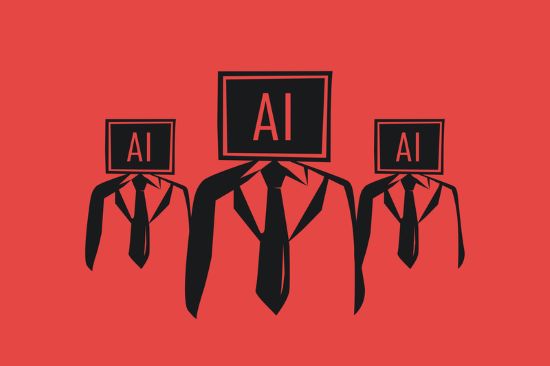To describe artificial intelligence (AI) in human terms when it comes to employment is alarming in so many ways. The companies developing AI are selling to the business world a scenario where fewer human employees need to be engaged. At the same time, they are telling employees that the AI applications they will be working with are workers just like them, albeit AI, to assuage fears of an unemployed future when automation makes them redundant.
For the employer, an AI worker comes cheap when compared to a human. The AI can work continuously. The human cannot. The AI doesn’t ask for a raise, doesn’t to take a vacation, won’t get sick, won’t strike, and won’t question company decisions.
Back at the beginning of the 19th in Great Britain, the textile industry began to mechanize. Formerly a cottage industry, textiles started being produced in factories which needed fewer workers and provided poor working conditions and low wages. Workers soon organized in opposition to mechanization. That’s when the term Luddite was used to describe a movement that smashed machines in protest. Luddites raided factories destroying automated looms and knitting frames that no longer required skilled labour.
Today, a Luddite is an individual who resists technological change. For Luddites, AI is the ultimate enemy. Technological advances before AI such as the personal computer, smartphones, and the Internet were seen as tools for worker productivity improvement. AI, however, makes workers redundant. Giving AI human characteristics by calling them workers is no more than a marketing tactic by AI developers with little consideration for the human workers these algorithms will replace.
Could AI replace me as a blogger? I have no doubt that could happen. Today, when I research topics, I use AI tools to answer a list of questions I produce at the outset before starting to write. Before I had AI tools I used Google Search. Now my search is done through an AI tool that organizes and prioritizes results and provides a summary outline for me to review that includes links and suggested follow-up questions.
This is my new way of working and it is saving me preparation time. I haven’t, however, relied on an AI to write any of the articles you read here, and when I quote an AI, I always acknowledge it.
I am not a Luddite, but I am beginning to have an appreciation of the history at the beginning of the Industrial Revolution that led to the movement. AI is already taking away jobs, and not ones in manufacturing. Software coders who often have multiple university degrees are being replaced, and the trend is escalating.
Before there was the term gig worker, I was already one of them. I studied to be a history teacher and graduated with no teaching jobs. Instead, I sold textbooks, read many of them, became an editor, a technology hardware, software and systems designer, and finally a high-technology business and telecommunications consultant coaching startups and billion-dollar companies. When I retired I turned to writing this blog.
I have a friend in British Columbia, Nick Arden, who like me is a business veteran who has reinvented himself more than once. He is launching a new consulting practice focused on workers concerned about the impact that technology is having on their jobs. In his recent note to me, he describes the rationale for developing this new program stating:
“Why This Matters – In today’s rapidly evolving technological landscape, concerns about job security due to AI and other innovations are not only valid but pressing. While the timeline for disruption remains uncertain, the risks are undeniable. Despite this, these employees lack the attention and support they need, leaving them increasingly vulnerable in this fast-changing environment.
Preparing for Technology’s Impact on Jobs – Technology is transforming industries faster than ever, leaving many employees uncertain about their future. In 2024 alone, mass layoffs displaced 172,000 U.S. workers – 88% from tech roles. Generative AI alone is predicted to impact up to 300 million jobs globally. The question isn’t if change is coming, but how we can prepare.”
How AI Will Penetrate The World of Work
Nick isn’t wrong when looking at the growing disruption to the workforce from the adoption of AI by businesses. In factories, automation has been an accepted standard for doing business. In offices, PCs and software replaced secretaries. Smartphone apps are replacing personal assistants.
For business, AI is seen as the next automation tool. Just how far, however, will AI go in penetrating the business world and even the academic one? After all, if I can use it to help me organize research, why not the research being done by academics?
I recently read about a “hackathon” conducted at the University of Mannheim in Germany that included more than 20 academic researchers and students looking to see if using AI could produce quality research papers suitable for journal publication. Their inspiration came from a recent survey published in Nature.
The University assumed that many of its students and some researchers were already using AI. The next step was to use it to generate publishable research. Could articles written with AI help meet the quality standards required by reputable journals? Participants brought current research and some even entire dissertations to the exercise. A non-AI control group participated to provide a comparison. The conclusion noted that AI “collaborators…can help streamline the writing process,” but were not “substitutes for human creativity or intellectual effort.”
I would argue that the hackathon’s conclusions were self-serving and defensive. Why do I say that?
The progress of substituting humans with AI is fed by an accelerating arms race among technology giants who rapidly release new versions of their latest AI tools. They are “AI workers” to business not just as collaborators but as replacements.
Could AI replacing workers who write software code soon be capable of writing scientific and technology-focused original research? Is the fate of our science to fall to AI experts assisted by robots and a few humans in university and non-academic research laboratories?
Without sufficient regulation, the arms race will continue and although the hackathon participants concluded they were still needed to provide “oversight…to review and test the framing, sense and overall integrity,” the truth may be – NOT FOR LONG.
How far will companies like OpenAI, AIX, Google, Meta, Amazon and others go to propose “AI workers” in all types of workplaces? What are the ramifications for humanity and meaningful work in the 21st century? The impact on workers whether assembly lines or the hallowed halls of academia is likely to be profound.









